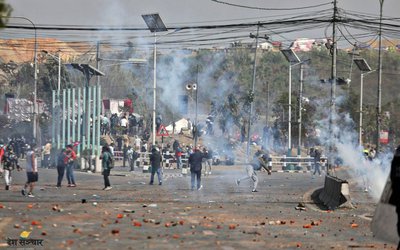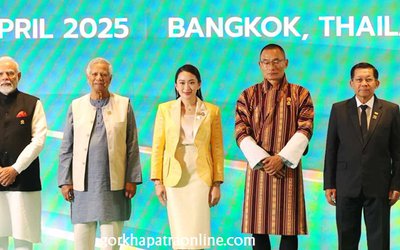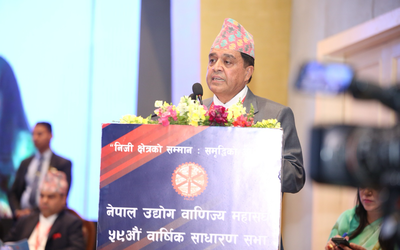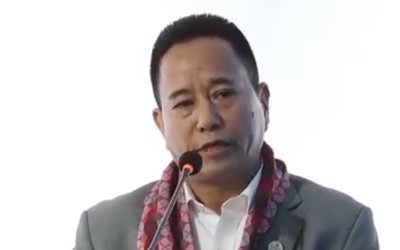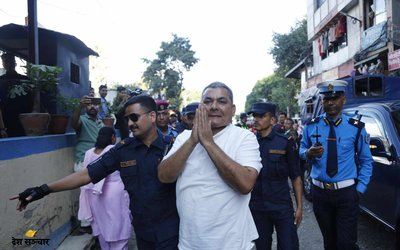
After taking part in the COP 21, Minister of Population and Environment Bishwendra Paswan spoke to New Spotlight on various issues regarding the currently concluded COP 21 meeting and its implications to Nepal. Excerpts:
When will the government ratify the Paris Climate Deal?
As the government has already welcomed the Paris Climate Deal as historic, we are in the process of ratifying the deal through the due process of law. As we have already started the process of ratification, Nepal will ratify the deal in the scheduled period. What I can say is that it is a major milestone in the UNFCCC process.
Many see there are still so many lacunas. How do you view this?
Paris Agreement is a compromise agreement between tiny nations and big and LDCs, Island and mountainous, developed and developing countries. Although it is still shorter than our demand, some 195 countries have decided not to allow the temperature to go more than 2 degrees Celsius. Actually it is well below 2 degrees Celsius, leading towards 1.5 degrees Celsius or pre-industrial period, which is in fact an ambitious goal. Along with Nepal other LDCs and small mountainous countries have been talking about 1.5 degrees. What I can say now is that this is win-win compromise leading to 1.5 degrees Celsius. This is the reason Nepal welcomed it.
How can Nepal fulfill the obligations?
First of all, the agreement has added the task on us to implement it. The ministry knows the needs of stakeholders. As declared, Nepal has to sign it by April 2016. After signing that Nepal will have to ratify this agreement from the Legislature Parliament. As it is in the broader interest of the country and the world, I don’t think there will be any problem in the ratification of the agreement. We are also working to translate this in Nepali language to distribute to common people and parliamentarians.
Why is the agreement important?
Smaller mountainous developing countries and LDCs are the most vulnerable of countries because of the climate change. As a LDC, Nepal emits a very little amount of green house gas but we have to face the problems. This is the reason Nepal needs a strong agreement to contain the emission of green house gas from developed countries.
How do you see Nepal’s participation in the United Nations Framework of Action on Climate Change, COP 2 in Paris?
As I have already mentioned that Nepal sees the agreement signed in Paris was a historic deal. Despite certain shortcomings, a least developed country like Nepal can benefit a lot from the Paris deal in the areas of adaptation. I am also very proud to say that we rode bicycle in Paris to highlight Nepal's and mountain countries' agenda. Along with me, other members of Legislature Parliament rode bicycles to express our concerns to global community.
How do you view the global recognition given to Nepal Climate Change Support Program?
As a minister from Nepal, the global recognition given to NCCSP was not only a matter of pride for me but for all the Nepalese. Our program was chosen as one of the five best cases out of 170 submissions. Through this program, Nepal’s climate vulnerable communities have shown that they can run good programs to benefit the communities. Our LAPA program has already received international recognition.
What challenges do you see now?
The challenges before us are how to maximize the benefits from Paris deal to the countries like Nepal. The challenges before us are how to address the climate change agenda and how to enhance adaptation capacity of local vulnerable communities and improve the livelihood options. Nepal needs to implement the programs related to the country as envisaged in the Paris deal. We need all different stakeholders, including other ministries and civil society.
What is the future plan of the ministry?
For the last two years, the ministry has had so many important issues in its pending list. I am giving a high priority to complete them. First of all, we will submit Intended National Determined Contribution (INDC) to UNFCCC. The ministry has already approved it. We have already started preliminary work on NAP. Similarly, working modality for clean development mechanism is on the way of drafting and the documents of Strategy on Climate Change and Gender is in final stage of approval. For the extension of NCCSP, the ministry has already initiated the negotiations with development partners.
What else?
In the coming days, the Ministry will formulate environment-friendly programs and plans in the interest of country and people. We will launch the campaign for environment. We need the support of experts and all other communities. We also need support from other communities. Nepal needs to make many good things. We should work to benefit Nepal.
What about the summit of mountain countries?
Nepal has already decided to hold a summit of mountain countries. Now our efforts should be directed towards the summit. Holding the summit of mountain countries of Least Developed countries is in the interest of all Nepalese.
The Ministry will constitute the Summit Organizing committee soon to hold the summit successfully. Nepal has been raising the mountain issues alone for a long time. We have raised the issues of mountain countries in COP 21 also. Rising temperature has had direct impacts on our mountains. Snow of the Himalayas is melting fast and many glaciers are receding. As the snow melts, our mountains are turning into black stones. When Nepal raised the agenda of mountain countries, Bhutan supported us and stood for the cause till the last minute. Bhutan supported Nepal in the mountain agenda. This is a major success. Nepal needs to lead in the mountain issue. We will hold the summit in March. My drive to use the bicycle will continue. I will make efforts to bring India and China in the summit of the mountain countries.
What is so special about your bicycle drive?
To reduce the emission level and reduce the dependency on fossil fuel, the bicycle is the best option. For the last three months, I have been campaigning for use of environment-friendly bicycles. I rode the bicycle in Paris showing Nepal’s commitment to clean environment. I also visited the Indian state of Utter Pradesh recently on a bicycle. For capital Kathmandu, this is the best mode of transport which will also contribute to reduce the emission. Ministry of Population and Environment is planning to make Kathmandu’s roads bicycle friendly with separate lanes for riders.
- BIMSTEC SUMMIT: Nepal’s Stand
- Apr 11, 2025
- IME GROUP: Expands Into Paper Industry
- Mar 24, 2025
- CPN UML: Instigated By India
- Mar 23, 2025
- ADB’S CHIEF ECONOMIST: Nepal Reduces Poverty
- Mar 11, 2025
- FM DR. DEUBA: A Successful Visit
- Mar 11, 2025






